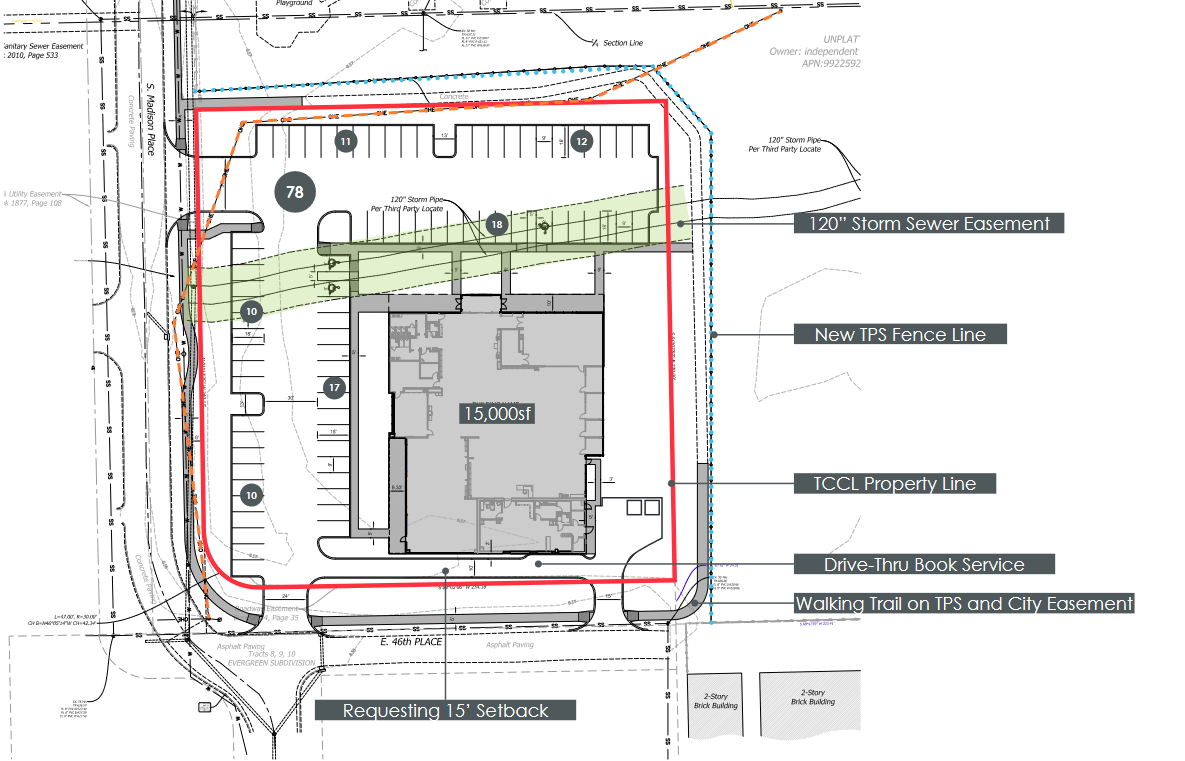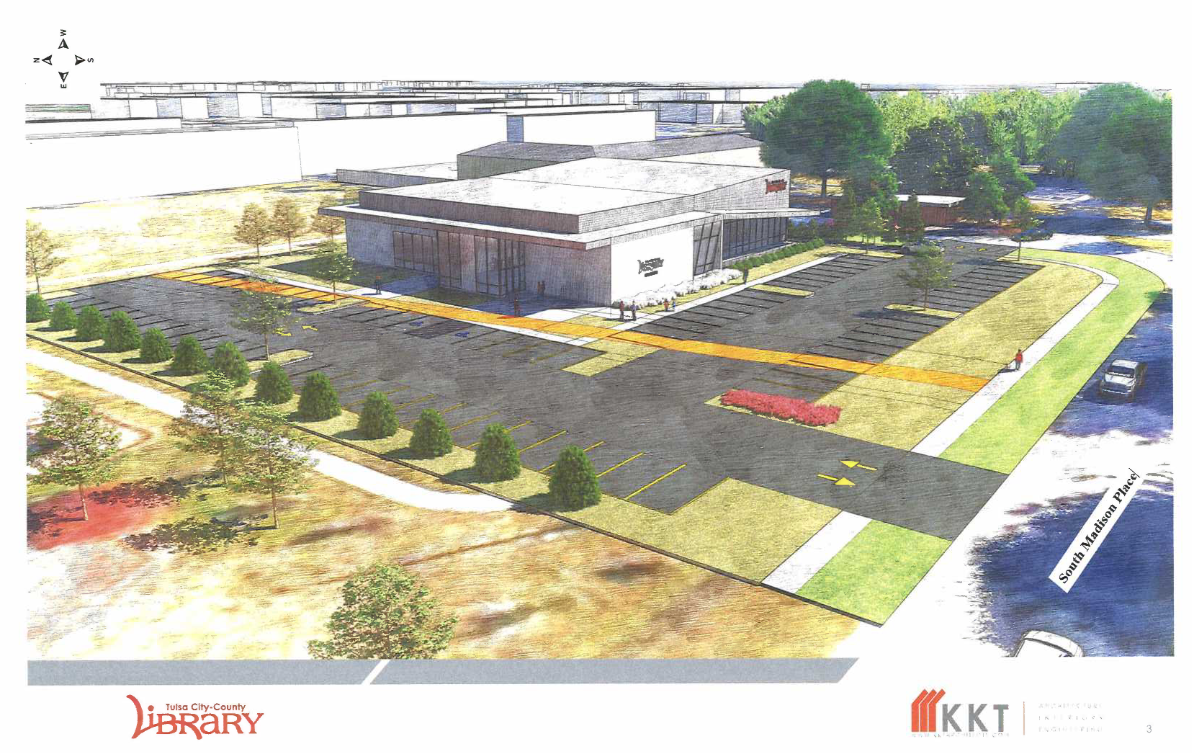Tulsa Zoning: September 2023 Archives

The City of Tulsa Board of Adjustment (BOA) has granted a special exception and a variance to allow the new Brookside Library to be built on the playing fields of the former Wright Junior High School, on the northeast corner of Madison Place and 46th Place South. A group of citizens have filed a lawsuit in Tulsa County District Court to halt the zoning permission, alleging conflicts of interest on the BOA. Under state law and local ordinance, the only appeal from a BOA decision is a lawsuit in district court.
The BOA case is BOA-23557. Tulsa's zoning code allows libraries within an RS-3 residential single-family zoning district, but only by special exception. In order to grant a special exception, the BOA must find (Title 42, 70.120.F.):
1. That the special exception will be in harmony with the spirit and intent of this zoning code; and2. That the special exception will not be injurious to the neighborhood or otherwise detrimental to the public welfare.
Paragraph B of the same section says that, "Applications for special exception approval may be filed only by the owner of the subject property or by the property owner's authorized agent." In this case, the applicant is Lou Reynolds of Eller and Dietrich representing the Tulsa City-County Library Commission (TCCLC), according to a letter to neighbors included in the BOA hearing packet; the current owner is Tulsa Public School (Independent School District No. 1). The same requirement applies to variances (70.130.C). This violation is one of the allegations in the lawsuit.
The application also requested a variance to allow a 15 foot setback for the library building on 46th Place instead of the 25 feet required for the RS3 zoning district. The zoning code explains the purpose of a variance in Section 70.130.A.
A variance is a grant of relief to a property owner from strict compliance with the regulations of this zoning code. The intent of a variance is not to simply remove an inconvenience or financial burden that may result from compliance with applicable zoning requirements. Variances are intended to help alleviate an unnecessary hardship or practical difficulty that would be caused by strict enforcement of the subject zoning code requirements. They are intended to provide relief when the requirements of this zoning code render property very difficult or impossible to put to reasonable use because of some unique or special characteristics of the property itself.
Variances are not a wild card. For example, you can't use a variance to allow a use that is forbidden for that zoning district. In this case, the building cannot be shifted further north because of a 120" storm sewer pipe that runs under the property; there is a required storm sewer easement that must be kept clear. This area would be used for parking. Of course, the proposed building could be built with a smaller footprint, possibly by building a second story, that would honor both the utility easement and the required setback.
The heart of the lawsuit, CV-2023-1809, is that Whitney Stauffer, one of the members of the Board of Adjustment who participated in the hearing and the vote, is also on the board of the Foundation for Tulsa Schools (FTS), which exists to support Tulsa Public Schools. The lawsuit also points out that Moises Echeverria-Ashworth is both the President and CEO of the Foundation for Tulsa Schools and a member of the Tulsa City-County Library Commission (TCCLC), and that Stauffer and Ellen Duecker, another member of the TCCLC, served together on the 2021 Bond Committee for Tulsa Public Schools. The special exception and variance received only 3 votes, the required majority for the 5-member body, but one of those three votes came from a member who, the suit asserts, should have recused herself.
The lawsuit states: "The interests of FTS have become so confused with the operations of Independent School District No. 1, Tulsa, Tulsa County, that it is inconceivable that Whitney Stauffer in her role as BOA Member and simultaneously chair of FTS could make an unbiased decision when it comes to BOA-23557." The complaint uses minutes from FTS and TCCLC meetings to illustrate the interconnections of these bodies.
You might well wonder why, in a city of 413,066 people, in a county of 669,279 people, the same few dozen people occupy the boards of all the public authorities, boards, and commissions, and interlock with many non-profits and foundations.
Orville Wright Junior High School opened to students in fall 1959, alongside Nathan Hale and Raymond S. McLain Senior High Schools in Tulsa's growing eastern and northern subdivisions, and the new Education Service Center, headquarters to Tulsa Public Schools, at 31st and New Haven. Wright was Tulsa's first circular school building, designed by Leon Senter and Associates. The large block between 45th Place, 46th Place, Madison Place, and Peoria Avenue was all owned by TPS and shared between Wright and Oliver Wendell Holmes Elementary School. Holmes was built in 1950, but closed in 1981, one of the earlier victims of falling TPS enrollment. It was placed on the TPS surplus property list in 1983, became the Brookside Center retail complex in 1988, and was purchased by Tulsa Ballet in 1991. When Holmes closed as a school, Wright became an elementary school. Collegiate Hall charter school opened in 2015 at Marshall Elementary School at 56th and Peoria, then, after TPS closed Wright Elementary in 2020, Collegiate Hall moved into the building. Collegiate Hall lost its charter at the end of last school year. College Bound Academy, another charter school, now has a campus in the Wright building.

The Brookside branch library opened in the former Guy Scroggs's Brookside Drug Store, 3516 S. Peoria, in January 1951, then moved in January 1962 to 1311 E. 35th Street, the old southside post office building. The South Brookside Library opened at 1207 E. 45th Street in 1966, replacing the Brookside branch. It was expanded in 1999, doubling from 3,360 to 7,120 sq. ft. The proposed replacement would have 15,000 sq. ft. and 78 parking spaces.
While there has been a library "in the neighborhood" for over 50 years, the current location is surrounded by commercial development and just a short distance from an arterial street on a residential collector street. The new location is deep in the neighborhood and larger. Just to the west of the current location there is a seldom-used side parking lot for the Walmart Neighborhood Market. If it weren't for Tulsa's ridiculous parking minimums that space could be repurposed as parking for an expansion of the existing library into its current parking lot.
MORE:
Backup copies: